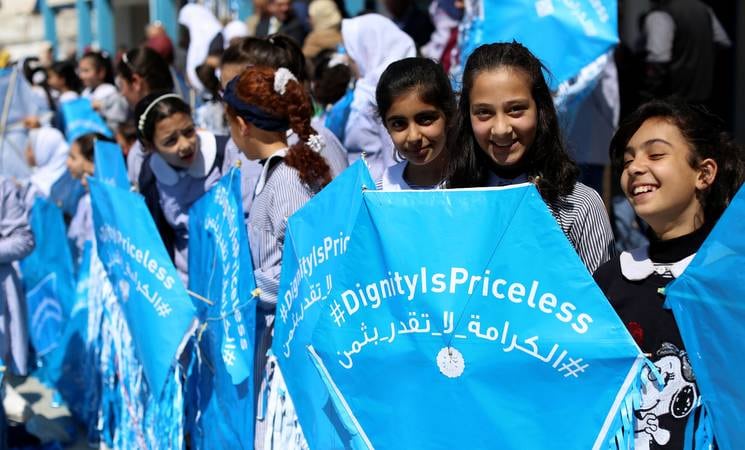
At around the time the State of Israel came into being, something over half the non-Jewish population of what used to be called “Palestine”, some 750,000 people, left their homes – some on advice, some from fear of the forthcoming conflict, some during it.
The UN body set up to assist them – the United Nations Relief and Works Agency (UNRWA) – began its work in May 1950, seven months ahead of the establishment of the Office of the UN High Commissioner for Refugees (UNHCR). As a result, Palestinian refugees have been designated and treated quite differently from − and much worse than − all other refugees the world over, ever since.
While the 1949 General Assembly resolution establishing UNRWA called for the alleviation of distress among the Palestine refugees, it also stated that “constructive measures should be undertaken at an early date with a view to the termination of international assistance for relief.” In other words, the new refugee agency’s mission was intended to be temporary.
By 2018 the “temporary” UNRWA had been transformed into a bloated international bureaucracy with a staff of 30,000 and an annual budget of around $1.2 billion. As for the number of Palestinians registered by UNRWA as refugees, that had mushroomed to 5.6 million as a result of its decision to bestow refugee status upon “descendants of Palestine refugees” in perpetuity – children, grandchildren and great grandchildren. The growth in UNWRA’s client base was therefore exponential year on year, justifying an ever-expanding staff and an ever-increasing budget.
It was at this point that US President Donald Trump decided enough was enough. He slashed US funding from $364 million to $60 million, and announced that as from 2019 US funding would cease. “The United States will no longer commit further funding to this irredeemably flawed operation,” stated the US State Department.
While the main UN agency dealing with refugees – UNHCR – concentrates on resettling them, facilitating their voluntary repatriation or their local integration and resettlement, UNRWA maintains millions of people in their refugee status decade after decade, expanding the numbers year on year.
Organizations secure in the knowledge of an ever-expanding client base, thus justifying continuous growth and an ever-increasing budget, provide ripe ground for malfeasance and internal corruption. So it has apparently proved in the case of UNRWA.
On July 20, 2019 it suddenly emerged that seven months previously a 10-page confidential internal report, with input from dozens of current and former UNRWA staff, had been sent to the UN Secretary General, Antonio Guterres. According to the Agence France-Presse news agency, the report alleged that UNWRA’s commissioner-general Pierre Krahenbuhl, and other top officials, had been guilty of a range of abuses including “sexual misconduct, nepotism, retaliation, discrimination and other abuses of authority, for personal gain, to suppress legitimate dissent, and to otherwise achieve their personal objectives.”
The Al Jazeera media network claims to have obtained a copy of the ethics office report from a source close to UNRWA, who said that agency employees were concerned about a seeming lack of action, given that the report was lodged with Guterres in December 2018. Now the UN Office of Internal Oversight Services (OIOS) has opened a probe into allegations detailed in the report.
The ethics report claims that since 2015 members of UNRWA’s inner circle have been steadily consolidating their power, but that the situation escalated markedly from the beginning of 2018, coinciding with the US’s decision to remove its funding. This, the report claims “served as an excuse for an extreme concentration of decision making power in members of the ‘clique’.” It further alleges that these developments led to an “exodus of senior and other staff” and a work culture “characterized by low morale, fear of retaliation … distrust, secrecy, bullying, intimidation, and marginalization … and management that is highly dysfunctional, with a significant breakdown of the regular accountability structure”.
Much of the report focuses on allegations surrounding the conduct of Commissioner-General Pierre Krahenbuhl, who took up the post in March 2014, citing a range of corrupt and unprofessional activities.
Shortly after the details of the report became known, the Netherlands and Switzerland suspended their funding of UNRWA. They were followed in August 2019 by the government of New Zealand.
UNRWA’s mandate from the General Assembly comes up for renewal every three years. Due to expire in June 2020, it was renewed during the 74th session of the UN General Assembly which came to end on September 30, 2019. Nothing has emerged in the media to suggest that Guterres’s investigation into the ethics report came up in the discussions.
Speaking during the 42nd session of the UN Human Rights Council on September 23, 2019, former UNRWA general counsel James Lindsay declared that the agency must evolve or dissolve. UNRWA’s major structural problem, he said, is its unique definition of who qualifies as a refugee. This differs fundamentally from the definition used by the UNHCR, which is responsible for all other refugees around the world. By not demanding that UNRWA adopt this definition,” says Lindsay, “the General Assembly has elevated politics over morality.”
All in all, the Palestinian refugee story is one of heartless exploitation of Arabs by Arabs – the callous manipulation of powerless victims for political ends, with little regard for their welfare or human rights. Whatever the result of the enquiry into the UNRWA ethics report, this inhumanity must be brought out into the open, the UNRWA farce of “refugee status” in perpetuity must be ended, and steps must be taken to allow people and their families who may have lived in a country for fifty years or more to settle and become full citizens.

